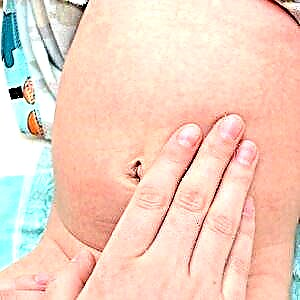If you are a parent, then you probably watch your child's every laugh, you are glad when he is feeling good. And you immediately notice if the baby begins to have health problems. Some unpleasant signs are a little harder to spot, though. It's about constipation.
Stool patterns in babies vary from child to child in the same way as in adults. What is normal for your child may be different from what is normal for another. Most babies poop 1 or 2 times a day. In other babies, it may take 2 to 3 days or more before normal bowel movements develop.
Bowel function will change dramatically over the course of a child's life. At times, these changes may indicate that the baby is constipated.
Constipation is a condition of the body when stools are not as regular as usual. The feces are plentiful, and going to the toilet is painful. Sometimes the stool may be loose, but it can also mean constipation in the baby.
Symptoms of constipation in infants
A baby who consumes exclusively breast milk may not have a bowel movement every day. Almost all of the nutrients are often absorbed. This is very common. Infants fed formula milk can have up to three to four bowel movements per day.
However, normal bowel movements (peristalsis) vary greatly in healthy children. It depends on the type of milk, on the introduction of coarse fibers into the food and on what specific foods are consumed.
Understanding the possible signs of constipation can help parents detect potential signs of constipation before having difficulty emptying them becomes a big problem.
Constipation in an infant can be identified by several symptoms:
 Stool retention. The number of bowel movements per day will fluctuate, especially if parents introduce new foods to the baby. If several days pass without a bowel movement, the baby may be constipated.
Stool retention. The number of bowel movements per day will fluctuate, especially if parents introduce new foods to the baby. If several days pass without a bowel movement, the baby may be constipated.- Voltage. If the child strains too much during the bowel emptying process, then this may be a signal of constipation. The stool of these children is very hard, like clay. Such feces are very difficult for the bowel movement, so the baby will push or strain more than usual to poop. Children may be fussy and cry when they have a bowel movement.
- Blood in the stool. If you see streaks of bright red blood in your child's stool, this is probably a sign that he is straining very hard to empty his bowels. The thrust and tension can cause tiny fissures around the anus, which then show up as blood.
- Hard stomach. A tight stomach can be a sign of constipation. Bloating and pressure from constipation can cause a bloated or stiff belly. Frequent colic can also be a symptom of constipation.
- Refusal to eat. With constipation, the child is quickly saturated. He may also refuse to eat because of the growing discomfort.
You may notice that the child is crossing his legs, grimacing, stretching out, squeezing his buttocks, or spinning in a chair. It may look like the toddler is trying to have a bowel movement, but instead he is actually trying to hold on to stool.
Causes of constipation in infants:
 nutrition. Changes in diet, lack of coarse fiber (fiber) or fluid in the diet can cause constipation in the child;
nutrition. Changes in diet, lack of coarse fiber (fiber) or fluid in the diet can cause constipation in the child;- disease. If a baby is sick and has lost appetite, changes in his diet can cause constipation. Also, constipation in an infant can be a side effect of taking certain medications. In a newborn, constipation can be a sign of a certain medical condition. For example, hypothyroidism - a decrease in the function of the thyroid gland;
- intentional retention of feces. A child can hold his chair for a variety of reasons. For example, to avoid pain when passing hard stools. This can be even more painful if the baby has a bad diaper;
- cow's milk allergy. An intolerance to cow's milk sometimes causes constipation in a one-month-old baby;
- heredity. Children whose family members suffer from constipation are more likely to develop this ailment. This can be due to common genetic or environmental factors;
- congenital diseases. Sometimes constipation in a newborn indicates an anatomical malformation, metabolic disorder, or congenital pathology of the digestive system;
- other changes. In general, any changes in a child's daily routine (such as travel, hot weather, or stressful situations) can affect their overall health and the way their bowels function.
If left untreated, constipation can worsen and cause various complications. The longer the stool remains inside the sigmoid colon and rectum, the harder and drier it becomes, the more difficult and painful it is to empty the intestines. Your child may be holding back their stools due to pain. This creates a vicious circle.
When should you see a doctor?
Constipation in children is usually not a serious condition. However, chronic constipation can lead to complications or signal an underlying medical condition.

Show your child the doctor if constipation persists for more than two weeks or if the following symptoms are present:
- loss of body weight;
- blood in the stool;
- bloating;
- vomiting;
- heat;
- Painful fissures in the skin around the anus (anal fissures)
- prolapse of the intestines from the anus (rectal prolapse).
Do not give a laxative or suppository to a baby without first talking to a doctor.
Diagnostics
The attending physician should do the following to determine constipation:
- Collect complete information about the medical history. The specialist will ask about past illnesses, nutrition and physical condition of the child.
- Do an examination, which will most likely include a digital examination of the child's rectum to check for abnormalities, cracks, or hard stools. Stool found in the rectum can be tested for blood.
Extensive research is done in more severe cases of constipation. Diagnostics consists of several procedures:
 Radiography of the abdominal organs. This routine x-ray test can help you see if there is a bowel obstruction.
Radiography of the abdominal organs. This routine x-ray test can help you see if there is a bowel obstruction.- Anorectal manometry, or mobility test. In this test, a thin tube called a catheter is placed in the rectum to measure the coordination of the muscles that cause bowel movement.
- X-ray with barium enema (X-ray contrast examination of the intestine). The intestinal mucosa is covered with an enema with a contrast agent (barium) so that the rectum, colon, and sometimes part of the small intestine are clearly visible on an x-ray.
- Rectal biopsy. In this test, a small piece of rectal mucosa is taken. They do this in order to make sure that the functions of the nerve cells are normal.
- Transit study, or study of markers. In this test, the child swallows a capsule that has markers that appear on X-rays taken over several days. The doctor will analyze how the markers pass through the baby's digestive tract.
- Blood tests. Blood tests are sometimes done. For example, on thyroid hormones.
Treatment of constipation in infants
Depending on various factors, your doctor may recommend what to do if your child is constipated. These can be procedures or certain drugs.

- Glycelax® children's glycerin suppositories. Can be used to soften stools in children from three months of age. The suppository softens the feces, stimulates the child's rectum and helps empty it. Glycelax® suppositories are specially designed for children: the dosage and size are designed for the child's body.
In case of constipation in a child, it is necessary to put one candle a day. Do not use suppositories regularly, because the child will develop a reflex to the act of defecation only after suppositories.
- Dietary fiber preparations. If your child is not getting a lot of fiber from their diet, adding fiber supplements can help. However, a child must drink plenty of water daily for these drugs to work well. Check with your doctor to find out which dose is right for your baby's age and weight.
- Laxative or enema... If a one-month-old baby is constipated due to a build-up of stool creating a plug, the doctor may suggest a laxative or enema to help clear the stool. These drugs include polyethylene glycol and mineral oil. Never give a child a laxative or give an enema without a doctor's instructions and instructions for the correct dosage and use.
- Hospital enema. Sometimes a baby may have such severe constipation that he must be hospitalized for a short time in order to receive a more thorough (siphon) enema that will clear the intestines.
How to treat constipation in an infant at home?
In addition to making changes in diet and regimen, different approaches can help relieve constipation in children at home.
Here are some tips on what to do when your baby is constipated:
 Help your child do the exercise. If the baby is crawling, ask the baby to do several circles. If not already crawling, try the following exercise instead. While the baby is lying on his back, gently move his legs in a circular motion, as if the baby is riding a bicycle.
Help your child do the exercise. If the baby is crawling, ask the baby to do several circles. If not already crawling, try the following exercise instead. While the baby is lying on his back, gently move his legs in a circular motion, as if the baby is riding a bicycle.- Belly massage. Measure three fingers width below your belly button. And on the left side of the abdomen, gently but firmly press with your fingertips. Massage until you feel a firm mass. Hold gentle but constant pressure for about three minutes.
- If the baby is exclusively breastfed, the mom may try to change her diet. After all, the baby is very sensitive to what the nursing mother eats. Remove foods suspected of causing constipation in babies from your daily menu.
- If you are feeding a baby with formula, talk to your doctor about switching to constipation formula for newborns, at least until the constipation disappears. Sensitivity to certain ingredients can also cause constipation. Sometimes the use of dill water has a positive effect.
- Proper drinking regime is essential for regular bowel movements. Water and milk are great for giving a child a drink. Prunes and pear juice speed up intestinal motility, which helps your baby to go to the toilet faster. If the juice is too sweet or sour for the child, try diluting the drink with water.
- If your child is 5 months old or older, you can try giving a few tablespoons of prunes, apricots, or pears to loosen the stool. To achieve a positive result, first give your baby a belly massage, and then feed high-calorie foods.
- If your child has hard, dry stools and you see small amounts of blood or even small cracks in the delicate skin near the anus, you can apply aloe lotion to the area to help heal. Keep your baby's butt clean and dry.
- A warm bath soothes almost everyone. The idea is that warm water will help the baby to relax, allowing his body to release what he was holding. Drying your baby after bathing is a good time to try the tummy massage technique.
- If none of the previous advice has helped relieve constipation, a doctor's appointment is necessary to rule out any other potentially serious medical conditions.
Never use soap for constipation. It acts aggressively on the rectal mucosa, leading to erosion and local inflammation, which will only exacerbate the situation. In addition, the soap bakes mercilessly, causing severe pain to the baby.
Preparing to visit a doctor
If a child has constipation for more than two weeks, the parents are likely to seek medical attention. If necessary, the baby will be referred to a specialist in digestive disorders (gastroenterologist). He will tell you in more detail how to treat constipation in infants.
Here's some information to help you prepare and know what to expect from your doctor.
You can prepare by following a few important steps:
 When making an appointment with your doctor, ask if there is anything you need to do beforehand. For example, limiting your child's diet.
When making an appointment with your doctor, ask if there is anything you need to do beforehand. For example, limiting your child's diet.- Record any symptoms you see in your child. Including any manifestations that may seem unrelated to the reason for which you scheduled the visit.
- Record the date the child's constipation started and any other coincidental events. Include notes on the frequency and appearance of stools, as well as any changes you notice in the stool (frequency, volume, and content), and what and how much the child eats and drinks.
- Write down identifying personal information, including any important stressors or recent life changes.
- Write down a list of all medications, vitamins, or supplements your child is taking. Tell your doctor what steps you have taken to try and treat your toddler's constipation.
Write down questions to ask your doctor. There are certain key questions to ask your doctor:
- What is the most likely cause of my child's symptoms?
- Are there any other reasons?
- What kind of research does my child need?
- How long can this last?
- What treatments do you recommend?
- How to help a newborn with constipation?
- Should I make changes to my child's diet?
- Should we visit another specialist?
- What to give a baby for constipation?
- Is there an alternative to the medicine you are prescribing?
- Can this problem be treated without medication?

Your doctor may ask several questions. You must be ready to answer them. Your doctor can clarify the following information:
- When did my child first show signs of constipation?
- Were these symptoms persistent or occasional?
- How serious are the symptoms?
- What, in your opinion, improves the condition of the child?
- What makes the baby's condition worse?
- Do you see blood in your stool or diaper?
- Does the child strain during the act of defecation?
- Does the infant have a hereditary predisposition to digestive problems?
- Has the child started taking any new medications or changed the dosage of the current medications?
- Can you describe the experience of potty training your child?
Since every child's bowel function is different, check out the conditions for a normal bowel movement for a baby. Note the usual stool size and consistency. This will help you and your pediatrician determine when constipation occurs and how serious the problem is.
Article rating:

 Stool retention. The number of bowel movements per day will fluctuate, especially if parents introduce new foods to the baby. If several days pass without a bowel movement, the baby may be constipated.
Stool retention. The number of bowel movements per day will fluctuate, especially if parents introduce new foods to the baby. If several days pass without a bowel movement, the baby may be constipated. nutrition. Changes in diet, lack of coarse fiber (fiber) or fluid in the diet can cause constipation in the child;
nutrition. Changes in diet, lack of coarse fiber (fiber) or fluid in the diet can cause constipation in the child; Radiography of the abdominal organs. This routine x-ray test can help you see if there is a bowel obstruction.
Radiography of the abdominal organs. This routine x-ray test can help you see if there is a bowel obstruction. Help your child do the exercise. If the baby is crawling, ask the baby to do several circles. If not already crawling, try the following exercise instead. While the baby is lying on his back, gently move his legs in a circular motion, as if the baby is riding a bicycle.
Help your child do the exercise. If the baby is crawling, ask the baby to do several circles. If not already crawling, try the following exercise instead. While the baby is lying on his back, gently move his legs in a circular motion, as if the baby is riding a bicycle. When making an appointment with your doctor, ask if there is anything you need to do beforehand. For example, limiting your child's diet.
When making an appointment with your doctor, ask if there is anything you need to do beforehand. For example, limiting your child's diet.

